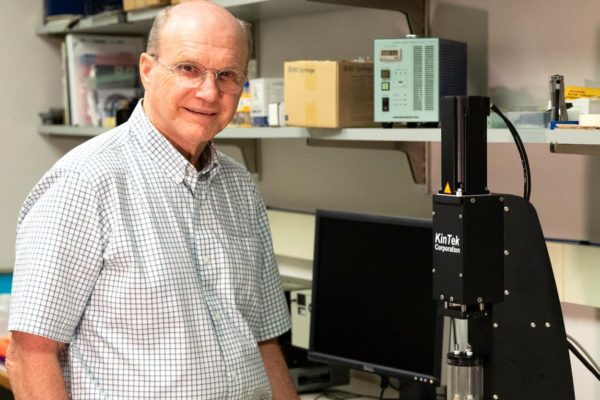For years, when The University of Texas at Austin professor Kenneth Johnson would go home to Davenport, Iowa, he would usually make plans to meet for breakfast — not with relatives or childhood friends, but with his high school chemistry teacher, Mary Sievert.
“She was really a dedicated teacher, and I kept in touch with her over the years because I still had family living in Iowa. Almost every time I would go back to visit them, I would contact her,” says Johnson, the Roger J. Williams Centennial Professor of Biochemistry. “And generally we would go out for breakfast because my family is not early morning people.”
Sievert was one of the teachers who inspired
Johnson to choose a career in science, and the influence she and other science teachers had on his life motivates him to give back to future scientists.
Johnson met Sievert when he took an advanced placement chemistry class. There, he says he saw her dedication and the extra effort she put forth to help students. She took him to a junior science event in Des Moines, Iowa, and later to the New York Academy of Science.
Johnson worked with Sievert on a science fair project that measured the rates of chemical reactions. This would later become the focus of his career and the type of work that would be linked to his name worldwide.
“It’s hard for me to come up with words to describe Mary as a teacher, other than describe her actions and what she did,” Johnson says. “She certainly worked hard to build a curriculum to teach us, but she was also very personable and set good standards and (was) willing to do a lot of extra things.”
His high school chemistry days set the stage for a notable career. Johnson has received the Pfizer Award in Enzyme Chemistry and is a member of the editorial board of the Journal of Biological Chemistry, among other honors.
Just a few years ago, Johnson says, Sievert called to say that she wanted to nominate him for the Davenport Central High School’s distinguished alumnus award. A member of the award committee later told Johnson that Sievert previously had never nominated anyone.
Johnson and Sievert made plans for dinner after the ceremony. But the dinner never happened.
“Unfortunately, she died of cancer before the event. So that’s the bitter part of it. I was very sad about that because I had looked forward to this being a very nice celebration of her as a teacher in addition to just being about me and my accomplishments,” Johnson says.
After her death, Johnson says he began to include his former chemistry teacher in the presentations he gave at conferences, trying to honor her memory. Then, several months later, he got an envelope in the mail from Sievert’s estate.
“She had put me in her will,” Johnson says.
The estate is still being settled, but he says that once that happens, “I’m going to just take that money and give it to the high school” for a scholarship in memory of Sievert.
Johnson says he wants the scholarship to aid students interested in pursuing science, and it’s a way to give back to his community.
To this day, Johnson says, he follows in the tradition of the good teachers he once had by teaching as they did: upholding high standards and assisting any student who asks for help.
“I remind everybody the debt we have to our previous teachers,” Johnson says. “The other thing is, I feel indebted to the people of Davenport, Iowa. I was not a very good student in elementary school. But starting in sixth grade … I had one really good science teacher after another. It was just a continuous stream of really great teachers that really inspired me in the sense that it made me realize that I had a mind, and I enjoyed using it.”



